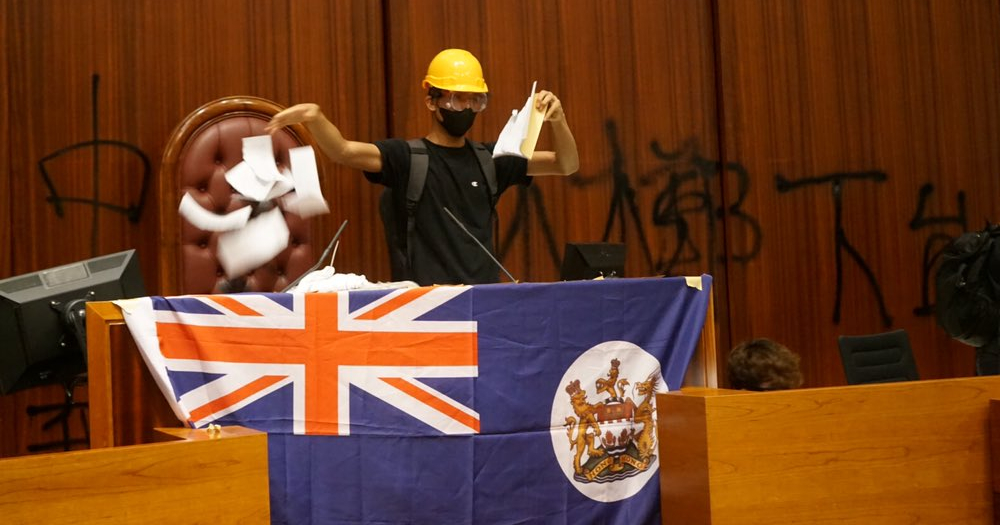About 30 protesters who stormed Hong Kong's Legislative Council on July 1 arrived in Taiwan to seek sanctuary, reported Apple Daily on July 18.
They did so to avoid the possibility of unfair prosecution by the Hong Kong government.
They might be followed by 30 more activists.
Hong Kong Free Press had also confirmed the numbers, citing a source with knowledge of the situation.
JUST IN: A group of protesters in Hong Kong attempted to storm into Hong Kong's Legislative Council building and broke windows in a fresh wave of protests.
— euronews (@euronews) July 1, 2019
This comes on the day of the 22nd anniversary of Hong Kongs return to Chinese rule: https://t.co/wWHqCwPTR5 pic.twitter.com/zJqadLURgM
A protester tears apart a copy of the Basic Law at the Legislative Council president’s desk covering by a pre-Handover Hong Kong flag - a very symbolic protest https://t.co/3xzXqlS0J8 pic.twitter.com/3mDBSDqEAl
— Kris Cheng (@krislc) July 1, 2019
Most were students
Apple Daily, citing unnamed sources, said most of the activists who left for Taiwan were students.
While some are planning to ask for long-term visas, some others are seeking asylum.
They are staying in various locations.
While some are financing their own rent, others are receiving help from local non-government organisations.
Tsai acknowledged the situation
Taiwanese President Tsai Ing-wen, referring to the Hong Kong activists as "friends from Hong Kong", said on July 19 that Taipei would handle the issue "according to humanitarian principles", AFP reported Central News Agency as saying.
Tsai made the comments from Saint Lucia, where she was visiting as part of her trip to Taipei's last remaining diplomatic allies in the Caribbean.
The Taiwanese government has also said on Friday, July 19, that it would provide necessary assistance to Hong Kong citizens seeking to stay in Taiwan.Increase in entry enquiries from Hongkongers
Chiu Chui-cheng, deputy chairman of the Mainland Affairs Council -- the department that oversees relations with China -- said the government has received a huge number of queries from Hong Kong citizens regarding entry and residency regulations, according to Financial Times.
Taiwan does not have formal refugee laws but is planning an asylum law.
As compared to other entities or countries, Taiwan's entry and residency rules for Hongkongers are more lenient.
Taiwan has received other political refugees from Hong Kong before
Central News Agency also said the cases could possibly be handled the same way as other self-proclaimed exiles from Hong Kong, such as Hong Kong bookseller Lam Wing-kee.
After disappearing into Chinese custody for about half a year at the end of 2015, he fled to Taiwan in April this year.
Taiwan has extended his visa to late October, reported Radio Taiwan International.
Hong Kong protesters find solidarity in Taiwan
Hong Kong's large-scale protests against a highly-unpopular extradition law have found solidarity in Taiwan, where many have also felt Beijing's creeping encroachment over the years.
Beijing's perceived heavy-handed approach to Hong Kong was seen a reminder to the Taiwanese that “Today Hong Kong, Tomorrow Taiwan”.
#Taiwan & the rest of the world are closely watching developments in the #HongKongProtests. As President of a country that walked the long road to democracy, I urge the #HongKong government to address the legitimate concerns of the people & their pursuit of freedom & democracy. pic.twitter.com/x2t8XNO1au
— 蔡英文 Tsai Ing-wen (@iingwen) July 2, 2019
Welcoming Hong Kong protesters risks incurring Beijing's ire
Tsai has mostly avoided any moves that Beijing could take as a deliberate provocation.
China regards Taiwan as its territory, and has not ruled out the use of force to take the self-ruling island under its control.
But she has expressed her support for the Hong Kong protesters, and frequently emphasised Taiwan's democratic values.
Relations between Taiwan and China have taken a dip after Tsai took office in May 2016.
Tsai has refused to affirm the “1992 Consensus”, which is a mutual agreement that there is only “one China”, although both sides interpret it differently.
She faces fierce competition from Beijing-friendly Kaohsiung mayor Han Kuo-yu in the presidency election set to take place in January next year.
Top image via Kris Cheng/Twitter
If you like what you read, follow us on Facebook, Instagram, Twitter and Telegram to get the latest updates.
